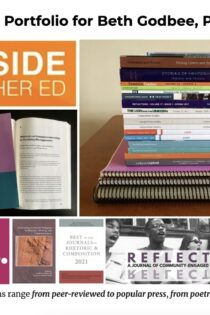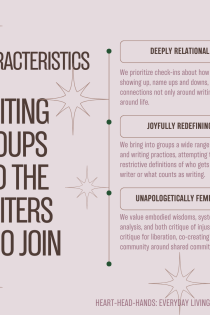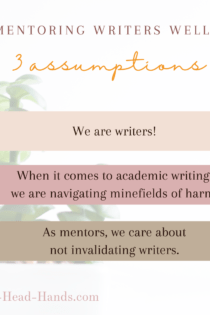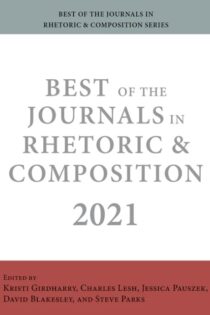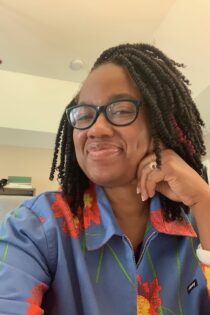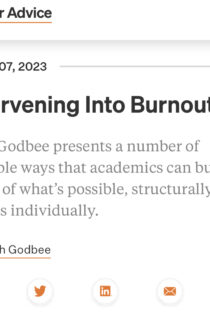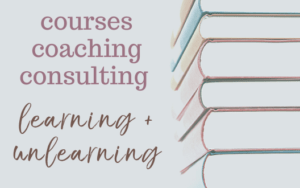I recently created a new writing portfolio, which I am excited to share! Because my SelectedWorks page was sunsetted this summer, I needed a new way to share publications. The portfolio highlights some, while linking to a fuller list (what I’d share as part of an academic CV). I start with academic publications and then share pieces from public and community writing. And I include a final section of meaningful writing that doesn’t always (or even often) make its way ... Read more ...
higher education
New Article: “Because We’re Going to Mess Up”: Practices for Accountability—Not a Piecemeal Approach
With gratitude, I write to share a new article: “‘Because We’re Going to Mess Up’: Practices for Accountability—Not a Piecemeal Approach” co-authored with good friend and frequent co-author Rasha Diab and published in College Composition & Communication (CCC). This piece has been a long time coming. We started drafting in 2019; first submitted in 2020; and have been revising, reshaping, and attempting to bring it to life these past 5+ years. The article arises, as ... Read more ...
Why Don’t I Center “Academic” in My Work?
You probably notice that when I talk about writing support and spaces -- from coaching to writing groups to retreats and workshops -- I don't describe the work as "academic writing support" or name explicitly "academic writing." This is despite the fact that many, MANY of the writers I work with and many of my closest people are doing academic projects, hold affiliations with academic institutions, and of course, are trained in academic ways. Me too! Similarly, ... Read more ...
Writing Support for Your Campus? The Case of the UNT CLASS WRite Program
This fall, I am beginning the second year of a faculty writing and mentoring program with the University of North Texas (UNT)’s College of Liberal Arts and Social Sciences (CLASS). The program was proposed by Priscilla Ybarra, Ph.D. (Associate Professor, Department of English) and is sponsored by Steve Cobb, Ph.D. (Associate Dean, CLASS). I share a description of the program here to give a sense of what’s possible for tailored writing support: support customized to meet ... Read more ...
Reflection Questions for Sabbaticals (and Transitional Seasons of Life)
My coaching practice often involves questions about sabbaticals and how to move through these transitional times in intentional, reflective ways. Questions include: How do I find a different pace, a pace that’s more my own? How do I mark this new season of life or new season of career? How do I set boundaries with colleagues, family, and friends? What if I want to consider a career change? How do I make writing a priority when it’s been deprioritized for so long? What if ... Read more ...
Mentoring Writers Well? 3 Assumptions about Mentoring Writing
What is involved in mentoring writers well? How can mentors support writers and writers’ various projects and aspirations? What are starting points for learning to mentor writing? So many of us (especially in higher education, literacy education, community education, and adjacent fields) are involved in mentoring and coaching writers. But, typically, we don’t have much training when it comes to mentoring. And much less for mentoring writing! Back in February, I ... Read more ...
How Mentors Can Support Writers and Counter Epistemic Injustice
You’re invited to an interactive workshop I’ll be facilitating on Monday, February 12th at 12:00-1:30pm ET titled “How Mentors Can Support Writers and Counter Epistemic Injustice.” The workshop is free and open to the public. This workshop is sponsored by the Ball State University Graduate School and the Office of the Vice Provost for Academic Affairs and is part of the Building Mentoring Capacities Workshop Series. Thanks especially to Dr. Robin Phelps-Ward, Associate ... Read more ...
Highlighting a New Publication: Chapter and Supplementary Material in Best of Journals in Rhetoric and Composition 2021
I am writing to share a new publication: a chapter in Best of Journals in Rhetoric and Composition 2021, edited by Kristi Girdharry, Charles Lesh, Jessica Pauszek, David Blakesley, and Steve Parks and published with Parlor Press (2023). This chapter includes both a reprint of my previous article “Rhetorical and Pedagogical Interventions for Countering Microaggressions” co-authored with Rasha Diab and with contributions by Cedric Burrows and Thomas Ferrel. It also ... Read more ...
Q&A with Candace Epps-Robertson: On Seasons of Life, Writing, and Career
This interview introduces Candace Epps-Robertson, Ph.D., a collaborator with Heart-Head-Hands, facilitator of writing groups, and co-creator of the new offering, “Pathways Through Burnout: A Cohort Experience.” Candace is a writer, researcher, and educator with deep commitments to justice and more than twenty years of experience in literacy education. She is also Associate Professor of English at the University of North Carolina at Chapel Hill, where she ... Read more ...
Intervening into Burnout, Building a Sense of What’s Possible
A new article, “Intervening into Burnout,” appears in Inside Higher Ed today. In this follow-up piece to “Honoring Ourselves and Each Other Through Burnout,” I offer examples of creative interventions into burnout. These examples are gifted to me through coaching, so I write with deep gratitude for people who are trying different ways of being, doing, feeling, thinking, relating and imagining in higher education. Here’s an excerpt: “Burnout is also never ... Read more ...

